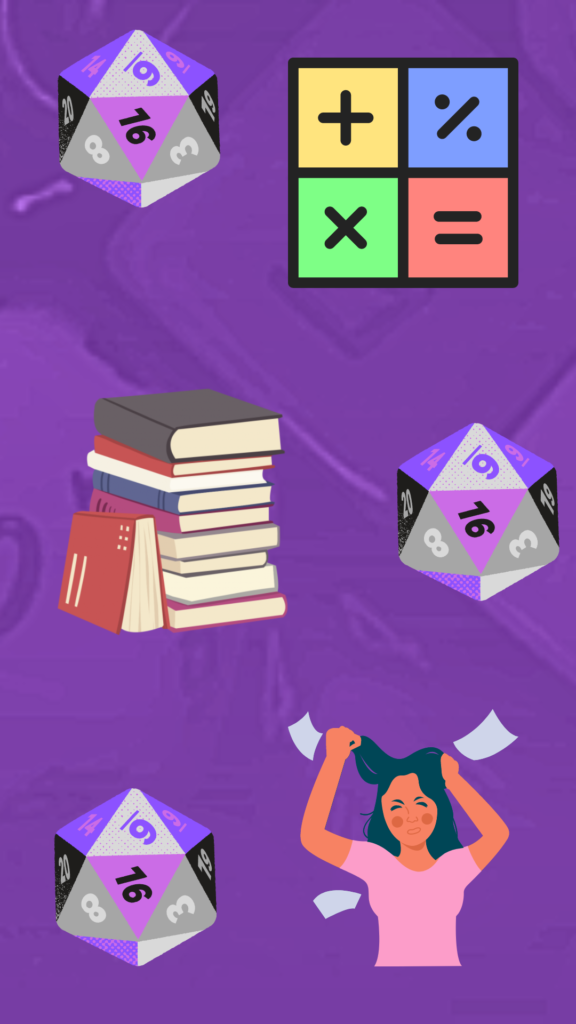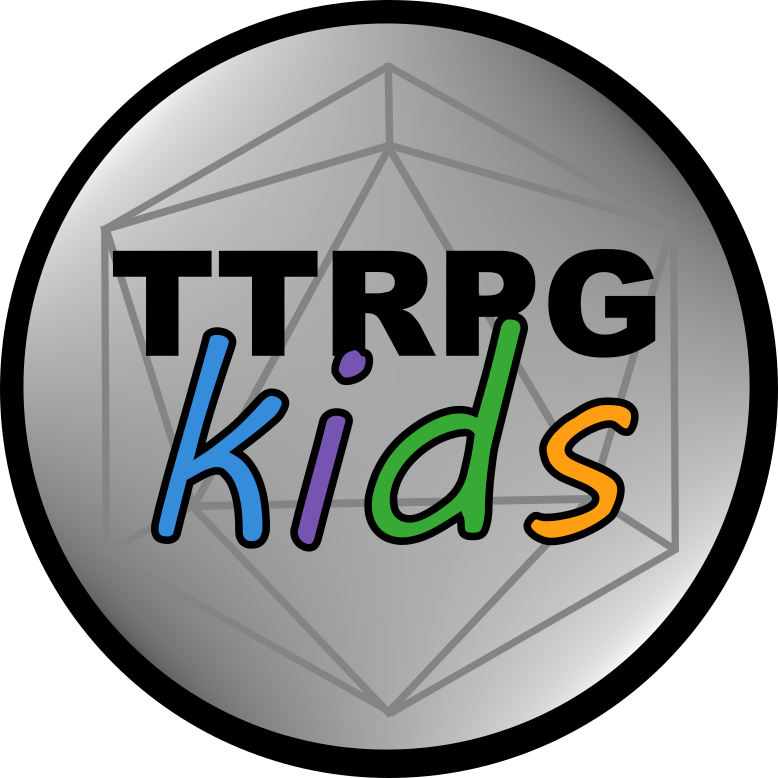TTRPGs for kids: The “Good Enough” session
While some concern is great (because it means that you’re thinking about it and trying to do well for the kids), it is also sometimes better to have a “good enough” session that actually happens versus a “perfect” session that stays in the planning phase.
Jump to:
- The Idea of the “perfect” TTRPG session
- Reframing your expectations
- Anticipating chaos
- Fear of rejection
- Thoughts on the “good enough” TTRPG session
The idea of the “perfect” TTRPG session
The idea of the “perfect” game for kids ends up coming from much of the same place as the “Mercer Effect” in D&D. People see or hear about what others are doing and then make that their goal or compare their kid’s ability to someone else’s. There’s sometimes comparisons about rules following requirements and systems between an experienced gamer’s friend group and what they want for their kids too. It happens in forums and social media, with friends, via podcasts, and, in a couple cases, from my articles on TTRPGkids..
The focus of this particular article is to help you get to that “good enough can be OK” state and let you know that it’s OK to not be perfect as compared to a standard you’ve set based on others… and to talk about the growth process, including some of the very “not perfect” situations that I’ve run into.
Reframing your expectations
The most common hang up that I’ve heard people having is expectations. While people don’t say the word expectations, a lot of the concerns that they’ve had boil down to what they think is a “must have” for their games:

- Following the rules the first time
- Following the plot
- Being able to play a campaign
- Session length/attention span
- Incorporating educational goals
- Adding social-emotional learning goals
- Using a particular system
- Interest in a particular genre
… and so on. It’s a lot of pressure to put on both yourself and the kids to meet these all of these goals!
In games with my kid, we will make an effort to follow a lot of the points above, but I also don’t expect us to follow everything either. When I post reviews, it’s from after we’ve had a successful playthrough that gave me enough material to understand the game. SO many times, we’ve had to restart because kiddo was cranky that day… or he veered into a direction that wasn’t part of the premade adventure and we had to go back the next day… or it took 2-3 sessions of using the mechanics before kiddo really got into it and was using them on his own..
My advice here is that, if any of the points above worry you, to reframe your expectations and focus on bite-sized goals.
Instead of saying, “I don’t think my kid can sit long enough to play a session, so we need to wait a few years”, try saying, “Let’s try a 10 minute story game and see how that goes.”
Or, when you think, “Oh, I want to teach my after school program about biology with this new TTRPG setting I made, but I’m not sure where to start because there’s so much to cover!”, try to reframe as, “Let’s commit to three sessions and focus on teaching about a couple points in the circulatory system.”
Those shifts both seem way smaller than the original expectation and are pretty similar to how I approach games with my kid too. These smaller goals may not be your initial idea of “perfect” but they are “good enough” to get things rolling.
Anticipating chaos
While this fits very well under the expectations header too, I made it a separate category because it comes up so often – game guides don’t start a TTRPG with kids because they fear the chaos that they KNOW a game with kids will bring.
For this one, my biggest tip is that yes, there will probably be some chaos, but that’s also part of the unique joy of playing a TTRPG with younger players.
It is OK to say no, you don’t want chaos and that’s a line you’re drawing for your own limits (respect your boundaries), but you can also choose to see what the chaos is like first too and try embracing it. It’s like the first time I tried sushi – it scared me because a bunch of people warned me about their friend’s sister’s cousin who had a bad piece of sushi one time, but I ended up trying it, and it’s one of my comfort foods now.
If you go in expecting chaos, that’s GREAT, just try not to fear it. Get curious. Maybe be reasonably prepared for murderhobos or PvP by having a session zero, but, also, get excited to hear what fun stories your kids will come up with instead of trying to avoid them. Understanding chaos without always knowing how to handle it ahead of time can still be “good enough”.
Fear of rejection
Another one that’s come up is people being concerned that if the first session isn’t perfect, kids won’t come back for another session.

Because of this, they plan the session for weeks or months or maybe always… and it’s easy to lose momentum when it’s always in the planning phase, so the game or club never happens.
Another path this sometimes goes down is that facilitators will pour their heart into making a world they love and then the kids don’t enjoy it as much as the facilitator anticipated or they don’t come back so the facilitator stops after the first try.
The goal here shouldn’t be to dump time and effort into the game to make it “perfect” by your standards and have them all come back or commit on the spot to a 20 session campaign. The goal can be to put just enough fun stuff, from the kid’s perspective, into one trial session, to see if you all have a good time or learn where to adjust before moving on.
One initial session, separate from a campaign, can be “good enough” to hook someone into TTRPGs. That’s how I got into TTRPGs – a family friend, Dave, ran a D&D mini-campaign, and I joined their last session. It was one single session, and it was AMAZING, and it had me hooked enough that, 4-5 years later when TTRPGs came up again, I dove in and ended up making this site. Talking to him recently, he told me how, from his perspective, he felt that he messed that session up, but, from my side, that was literally one of the most memorable nights of my life, and it ended up having an incredible impact later. This can totally be the case for starting a game with kids too. You might not always see the impact, but it is there.
Overall thoughts on the “good enough” TTRPG session
The main message here is that I don’t think any TTRPG session is going to be “perfect” for everyone at the table, so don’t put that pressure on yourself (or your players) to try to pull that off and let is stop you from running a “good enough” session that could change one of your player’s lives for the better. Think about the main reason you want to run a TTRPG for your kids, set your expectation to something very manageable, and approach it with curiosity.
There will be growing pains and maybe relearning some techniques that you’re used to using with games for grown ups, but… is that OK? I’m still learning with every session that kiddo and I play together, and that’s alright. Our games are far from perfect – we work through emotions over poor rolls, end sessions early, bust out our safety tools, and dance around storylines – and that’s OK because all of our games are good enough that my kid and I are having fun together.
If you liked this post, make sure to subscribe to the TTRPGkids monthly newsletter to stay up to date on the latest reviews, tips and tricks, game and podcast list updates, and more! Thank you for playing tabletop RPGs with your kids and sharing this awesome hobby with the next generation!



Love this so much!
My very first kids’ TTRPG group was a D&D campaign that I began *as I was learning to play*. My friends’ kids were begging to do the “grownup” TTRPG thing, so we all threw ourselves into it with little knowledge and lots of enthusiasm.
Despite that, I had so many of the worries you talk about here. When I got a better grasp on the rules, I was afraid the kids would be frustrated about changing expectations.
My group was old enough (8-10 at the time), that we talked through things together and changed small pieces as we went until we had adjusted to a fuller understanding of the game.
Definitely a learning curve, but I’d encourage anyone who’s thinking about a kids’ TTRPG group to jump in and try it! The kids I run games for are kind, hilarious, forgiving players (and sometimes murderhobos). We’ve figured out how to set expectations and boundaries in our group through trial and error, and they’re learning things that never occurred to me to teach!
Thanks for this great piece that articulates so well thoughts I’ve not been able to fully express!
Thank you Sarah!! I’m glad it resonated with you and reflected the experiences that you had with starting your own group. I fully agree with you here – I think no matter how much you prep, there will still be a learning curve because this is very much a learn-by-doing kind of experience. There will sometimes be mistakes or challenges, so aiming for “good enough” versus “perfect” sets a realistic expectation that you can actually achieve and everyone can feel good about. Thank you for commenting on this, as it helps me to feel like I hit the mark and it is helping!!